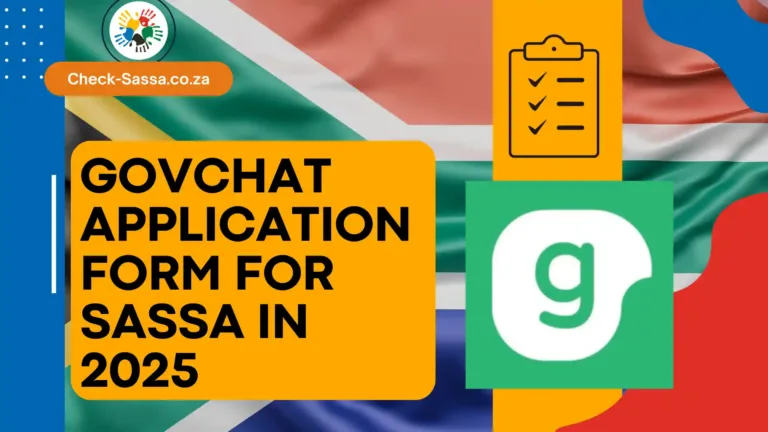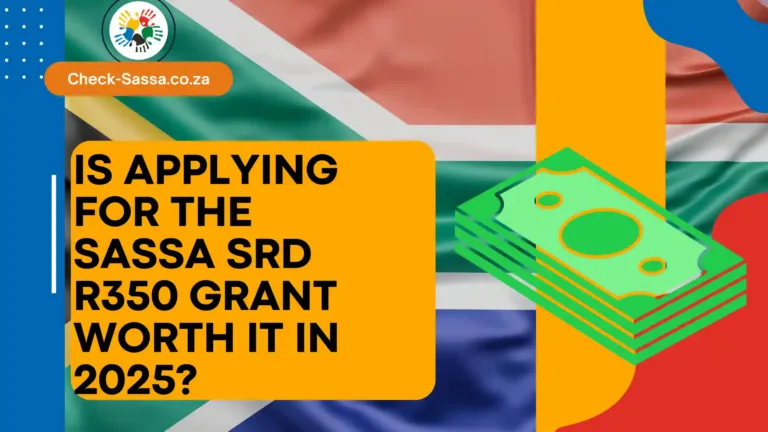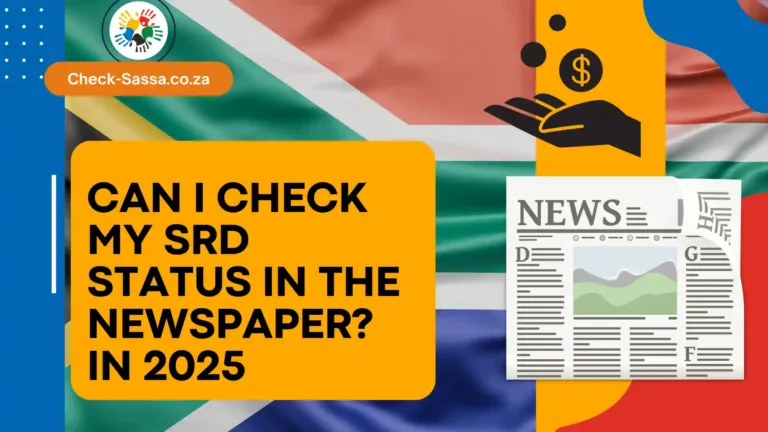SASSA “Self Exclusionary Response Found” Status Explained

If your SASSA status indicates “Self Exclusionary Response Found,” it means the information you provided suggests you are ineligible for the grant.
This typically occurs if you have a source of income exceeding R350 per month or if you are currently residing in a government facility.
What “Self Exclusionary Response Found” Status
The “Self Exclusionary Response Found” status indicates that, based on the information you provided in your SASSA application, the system has determined you are ineligible for the grant. This may occur if you answered “Yes” to questions suggesting you have a monthly income exceeding R350 or that you reside in a government facility.
The SASSA Social Relief of Distress (SRD) grant of R350 aims to support unemployed individuals who lack any other source of income and urgently need financial help. If your application suggests you already have an income, SASSA will assume you do not qualify for the grant.
Why Did You Receive the “Self Exclusionary Response Found” Status?
Several factors might contribute to receiving this status:
- Incorrect Responses: This status often arises if you mistakenly answered “Yes” to questions such as “Are you working?” or “Are you earning more than R350 per month?” These responses signal to SASSA that you possess an income, rendering you ineligible for the grant.
- Errors in the Application: Sometimes applicants unintentionally select incorrect options while completing the form, leading to this status.
- Outdated or Incorrect Information: If the details you provided are incorrect or outdated, the system might indicate that you have an income when you do not.
- Voluntary Withdrawal: The applicant may have voluntarily withdrawn their application for a social grant.
Don’t Worry—It’s Fixable!
If you received this status due to an error, there’s no need to panic. You can appeal the decision, and with the right steps, you may successfully have your grant approved.
How to Avoid the “Self Exclusionary Response Found” Status
To prevent this status, carefully review the SASSA Declaration and Consent form before applying. Ensure you meet all eligibility criteria, which include:
- Being a South African citizen or permanent resident
- Being unemployed and not receiving any other government assistance
- Having no other income or earning less than R350 per month
When filling out the application form, be honest. Answer “No” to questions regarding employment or earning over R350 per month if that applies to you.
Honesty is Crucial
Never submit false information on your application. If SASSA discovers any discrepancies, they can reject your grant, bar you from receiving future assistance, and potentially pursue legal action against you for fraud. Being truthful in your application is vital for ensuring your eligibility and securing the support you need.
Reasons for Self-Exclusionary Response Found Status
There are several reasons why an applicant might receive the Self-Exclusionary Response Found status:
- Voluntary Withdrawal: The applicant may have voluntarily withdrawn their application for a social grant.
- Change in Circumstances: The applicant’s circumstances may have changed, making them ineligible for the grant.
- Duplicate Application: The applicant may have submitted multiple applications, leading to confusion and potential self-exclusion.
- Incorrect Information: Incorrect or incomplete information provided during the application process can also result in this status.
Implications of Self-Exclusionary Response Found Status
Receiving the Self-Exclusionary Response Found status has several implications:
- Suspension of Benefits: The applicant’s social grant benefits will be suspended until the status is resolved.
- Review Process: The applicant will need to undergo a review process to determine their eligibility for the grant.
- Delay in Payments: There may be delays in receiving grant payments until the status is clarified.
How to Resolve the “Self Exclusionary Response Found” Status
If you think you received the “Self Exclusionary Response Found” status due to an error or incorrect information, follow these steps to fix it:
Step 1: Update Your Application Answers
Log in to the SASSA Services Portal and revise your application. Ensure you change any “Yes” responses to “No” regarding employment or income questions.
Step 2: File an Appeal with SASSA
Once you’ve corrected your application, you need to file an appeal with SASSA for a reconsideration. Here’s how:
- Visit the Department of Social Development (DSD) appeals website: SASSA Appeals.
- Click on “Click here to lodge an appeal or check appeal status.”
- Enter your 13-digit South African ID number and registered phone number to request a One-Time PIN (OTP).
- Input the OTP you receive via SMS on the website.
- Select the month for which your grant was rejected.
- Attach necessary documents, such as bank statements for the last six months, proof of residence, and your ID.
- Provide a clear and concise reason for your appeal, such as “I mistakenly answered ‘Yes’ to the employment questions.”
- Submit the appeal form.
Step 3: Await ITSAA’s Decision
Your appeal will be reviewed by the Independent Tribunal for Social Assistance Appeals (ITSAA), which manages all SASSA appeals. This review process may take between 60 to 90 days.
During this period, ITSAA will assess your case and the supporting documents. If they determine that you meet the eligibility criteria for the SRD grant, they will overturn SASSA’s decision, and you will begin receiving your grant payments.
If your appeal is denied, ITSAA will inform you in writing, detailing the reasons for their conclusion regarding your ineligibility for the grant.
Common Questions SASSA May Ask
When verifying your authenticity, SASSA may ask a variety of questions tailored to your individual circumstances. Those who have visited SASSA offices have noted several common inquiries that personnel typically pose.
While the questions can be specific and vary based on your situation, it’s essential to approach the process honestly. Transparency will guide you in the right direction.
Here are some frequently asked questions:
- Are you currently receiving any financial assistance or benefits from other organizations or agencies in South Africa?
- Do you have sufficient assets to support yourself throughout the year?
- Do you have a stable source of income or an established business?
- Do you have a close family member who is financially secure?
- What motivated you to apply for the SASSA grant?
- How do you allocate your SASSA funds each month?
- What is your highest level of education, and are you currently employed?
- You mentioned ABC in your application; can you provide documentation or proof of this?
Frequently Asked Questions
How long does it take to resolve a self-exclusionary response?
After you submit a reconsideration request, SASSA may take several weeks to process and review your updated information. Be sure to regularly check the SASSA Status Check Page for updates.
Can I receive the SRD grant if I am receiving UIF?
No, applicants receiving UIF benefits are ineligible for the SRD grant, which will automatically trigger a self-exclusionary response.
Can I reapply after receiving a self-exclusionary response?
Yes, you can reapply for the SRD grant if your circumstances have changed. Make sure your new application accurately reflects your updated situation, including any changes in employment status or income.
How can I appeal a self-exclusionary response?
You can appeal by submitting a reconsideration request through the SASSA Reconsideration Page. This will prompt SASSA to review your application again based on your corrected or updated information.
Why was my SRD grant application declined?
Your application may have been declined for several reasons, such as receiving other grants, UIF benefits, or providing incorrect personal information. Visit the SASSA Status Check Page for specific details on why your application was declined.
What does “Self Exclusionary Response Found” mean on my SASSA application?
This message indicates that SASSA believes you have another source of income or are receiving government support, making you ineligible for the SRD grant based on the information you provided.
How can I avoid receiving a “Self Exclusionary” status?
Carefully read the eligibility criteria and only apply if you are unemployed, have no income exceeding R350 per month, and are not receiving any other government assistance. Answer all questions truthfully and accurately.
What should I do if I accidentally answered “Yes” to the employment or income questions?
No need to worry. Log in to the SASSA portal, change your answers to “No,” and then submit an appeal with supporting documents to have your case reconsidered.
What happens after I submit my appeal to SASSA?
Your appeal will be reviewed by the Independent Tribunal for Social Assistance Appeals (ITSAA), which may take 60 to 90 days. You will be notified of their decision via SMS and in writing.
Conclusion
In summary, a “Self Exclusionary Response Found” status suggests that you may not qualify for the grant due to existing income or government support. If you inadvertently answered “Yes” to the eligibility questions, there’s no need to panic. You can rectify this by carefully updating your responses and submitting an appeal through the SASSA portal. Follow the outlined steps and await a decision from the Independent Tribunal for Social Assistance Appeals (ITSAA), which may take 60 to 90 days. Stay patient and keep an eye on your status updates for a successful resolution.

I’m Luan Arno, the owner of Check-SASSA.co.za, where I help South Africans navigate SASSA services. As a father of two living in Johannesburg, I’m passionate about making essential information accessible to those in need. With a background in community service and digital communications, I aim to simplify the process of checking benefits. When I’m not working, I love exploring our beautiful country with my family. Thank you for visiting Check-SASSA!






